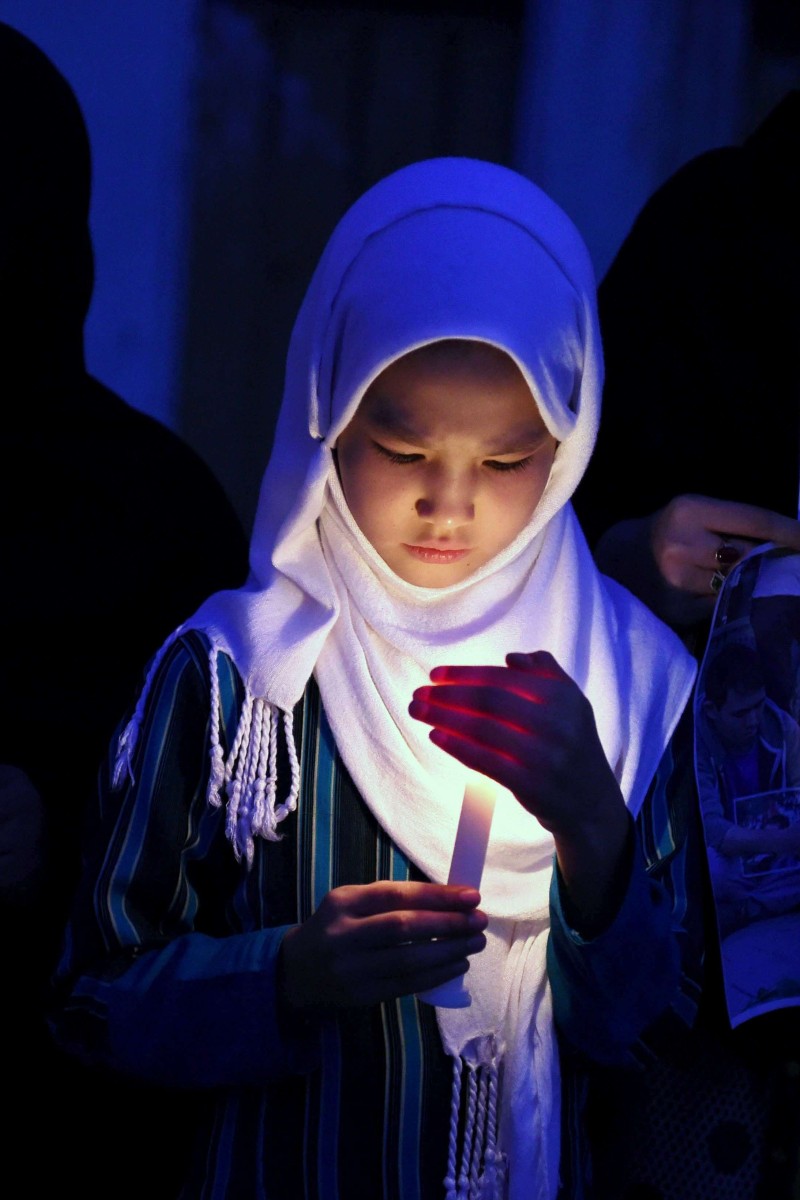 A Pakistani girl lights a candle during a tribute ceremony in Quetta on July 24.
A Pakistani girl lights a candle during a tribute ceremony in Quetta on July 24.Every single evening when the sun goes down, people come to a rough-looking cemetery in Kabul, Afghanistan. The rows of stones that mark the graves have photos of the dead or have names painted on them.
What happened?
The bodies that lie here are among the victims of a terrorist bombing on July 23 that targeted a protest by a minority group in the Afghan capital. The Hazaras had been demanding that electrical power be brought to their ethnic homelands, which do not have electricity. The double suicide attack left 80 people dead and 230 wounded. A group that is linked to the Islamic State (IS) militant group claimed responsibility for the attack.
The bombing has not caused a split in the country between the Hazaras, who are Shiite Muslims, and the Sunni, who form the majority in the country, as many people feared it might. Sunnis have donated blood at hospitals following the attack, and leaders from different ethnic and political groups have condemned the bombing.
The explosion did not just take lots of lives, mostly those of young protesters from the “Enlightenment” crusade. It also brought an end to the Hazaras’ non-violent reform movement, and further inflamed the anger of the minority group.
A split in the movement
There are around three million Hazara, and the community is now becoming increasingly split between its conservative leadership, moderate intellectuals, and the young who support radical and aggressive change.
“The Enlightenment movement has divided us. People are angry and their emotions are being used by various groups to create pressure on the government,” said moderate Hazara Mohammed Alizada. “We oppose the old warlords who only made deals and never demands for the people, but we need gradual reform with the new generation – not a hardcore agenda.”
In the capital, the foreign terrorist organisation responsible for the July 23 bombing has been overshadowed by the ethnic power struggles under the government of President Ashraf Ghani. This issue has been particularly highlighted by the disagreement between Ghani and the Hazaras’ “Enlightenment” crusade.
Protest history
The Hazara protests first attracted notice last November when thousands demonstrated after a nine-year-old Hazara girl and six other people were killed after militants boarded a bus. The peaceful rally made the nation aware of the problems that the ethnic group (which makes up 10 per cent of the country’s population) suffer, and won popular support.
Their popularity slowed when the group then decided to make the protest about their demands to redirect electrical power lines from a planned power route. Eventually, Ghani agreed to bring electricity to Bamyan province but decided to leave the power corridor in another region as planned.
The activists decided that was not enough and accused the government of ethnic discrimination. They held a rally in May, which officials allowed; but they were blocked off from filling up Kabul’s official district, and so planned a second protest in July. The protest route in July was once again blocked off and the huge crowd had nowhere to turn at the city’s Deh Mazang Square. This led to an ideal situation in which to stage a suicide bombing.
Blaming the government
Hazara leaders began to accuse the government of helping the bombers and failing to protect the marchers. One was Raihana Azad, 34, who said that officials had made the bombing possible and stopped victims from reaching hospitals.
Azad accused Ghani’s government of continuing to discriminate against Hazaras and said the president was behaving like a dictator.
“We have been discriminated against, and I will keep raising my voice even when nobody listens, but we are not militants and we will never resort to violence,” she said. “We believe in democracy. We want the next generation to grow up thinking that it is not a crime to be Hazara.”
Blaming the Hazara
However, some officials have told a different story. They have privately accused some leaders of the protest of refusing repeated invitations by the president to meet and talk, even after he found the funds to help Bamiyan receive electricity. The leaders, the officials said, have put their followers at risk in order to push their own agenda.
“I was filled with joy when the big demonstration happened for the girl [who was killed in November], but this incident has reversed it,” said a senior aide to Ghani. “The radicals came in to exploit an opportunity, they pushed too hard and it backfired. We were all worried that the terrorists would look for a soft spot, and we engaged [the protest leaders] at a high level right up until the march. But they said no, we will march, and tragedy happened.”
We cannot give up
Visitors walked among the graves thislast week and kneeled to look at the names and photos of the victims. Some showed young men wearing casual clothes, described as engineering or psychology students.
One 19-year-old woman talked about how these youths had died so that the Hazara could stand up for themselves.
“For now we have been stopped, but they have given their blood, so we cannot give up. This fight must go on.”
